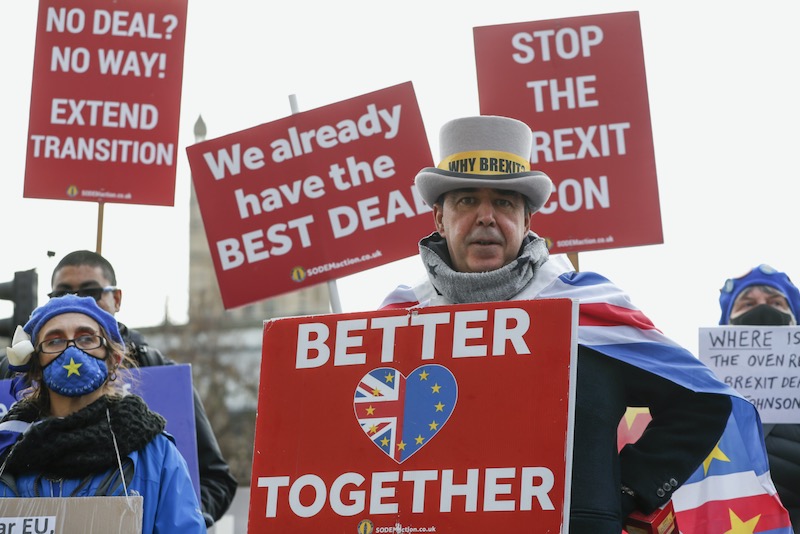Why Britain can only blame itself for Boris's Brexit disaster

Anti-Brexit demonstrators stand outside the Houses of Parliament in London this week. - Han Yan/PA
You don’t need a spoiler alert to be warned that the story is likely to end badly. The Brexit negotiation was an attempt to build a bridge that logically could not exist. Boris Johnson famously wanted to have his cake and eat it; but the European Union, less famously, had much the same idea. But if you eat your cake, you cannot, at the same time, have it.
Unfettered access to the EU single market cannot exist simultaneously with “taking back control”, the core slogan of the Brexit campaign. The single market presupposes uniform standards amongst all who take part. No competitive advantage was to be gained by hidden government subsidies, nor by treating workers less well, nor by taking short cuts over safety or environmental standards.
“Having its cake” from the British side always meant leaving open all these possibilities, precisely to gain that advantage. Parliament could theoretically at some point repeal the laws against child labour, hand out government cash to save struggling businesses, or allow any or every product on to the market regardless of whether it was safe or not. GM food and chlorine-washed chickens and so on could all be on the menu if Parliament so wished, once it exercised its sovereignty. The point, the “Anglo-Saxon business model” as seen from, say, Paris, was about the sovereignty of free markets.
And neither free markets nor absolute Parliamentary sovereignty are compatible with the EU single market. It may be “single” but it is also heavily regulated. Indeed, there is more than a trace of Catholic Social Teaching in this philosophy, which is where the Christian Democratic tradition in Continental politics meets the Social Democratic tradition. Both see free markets as potential enemies of the common good; both see them as a potential threat to workers’ rights. So market forces have to be channelled and redirected so they do not just serve the interests of shareholders but also of all the other stakeholders, employees especially.
There is the view on the right of Anglo-Saxon politics that market forces are the only real engine of economic growth, and economic growth is the rising tide which “lifts all boats,” benefiting more or less everybody. Therefore the less the State gets in the way the better. As initially conceived by Margaret Thatcher, the EU single market would be as unregulated as possible, as free as possible, thereby generating economic growth as efficiently as possible. As she said in Bruges in 1988, “We have not successfully rolled back the frontiers of the state in Britain, only to see them reimposed at a European level, with a European superstate exercising a new dominance from Brussels.”
The EU, for its part, wants to safeguard the single market. That is its version of “cake”. It was prepared to find out by negotiating whether it could also eat it, that is to say to trade with the UK on jointly agreed terms. But as by far the bigger partner, with 27 member nations, those terms were bound to be the EU’s terms. Unless the UK was prepared to be a more or less passive recipient of other people’s laws, accepting whatever terms the EU offered, there was not likely to be any common ground. And so it has proved.
It is true the UK could offer, and more or less has offered, to begin the new relationship from the same starting point. But even giving a free trade agreement the status of a treaty, and therefore bound by international law, would not guarantee anything. The British Parliament would still be sovereign. The cake would still be on the table.
The British Government’s willingness to set aside unilaterally its obligations under international law in the EU Withdrawal Agreement was a wide-open admission that Albion was willing and able to be as perfidious as it pleased, whenever it suited it. Any lingering hope that Britain might be trusted to keep its word was ditched into the English Channel by that alone, and any lingering temptation to take Boris Johnson at his word was vanquished. He was never thought of as an homme sérieux anyway, but as a newspaper columnist who had made his name sailing so close to the truth that he had sometimes been caught crossing the line.
A reputation for dishonesty and betrayal has meant that any assurances that Britain would behave honourably once it left the EU were just not credible. Maybe, on all the critical criteria for free trade with the EU Single Market, Britain intended to do better, not worse, than the rest of Europe. Maybe, far from seeking a competitive advantage by lowering standards, it wanted to raise them. Indeed Johnson might even have meant this when he said it. But next week, next month...? Who knows?
I have mentioned before in this space how one biographer of Johnson, Andrew Gimson, quoted a letter Johnson’s housemaster at Eton had written to his parents, observations which seem even more relevant today than the day they were made. “Boris sometimes seems affronted,” he wrote, “when criticised for what amounts to a gross failure of responsibility... I think he honestly believes it is churlish of us not to regard him as an exception, one who should be free of the network of obligations which binds everyone else.” That is the very definition of what we would call a chancer, someone whose contact with the truth is variable, whose personal obligations are optional.
Those words should serve as the epitaph to the forthcoming failure of the post-Brexit negotiations. The Tories elected him as their leader knowing he was a chancer, and the country voted for him a year ago knowing that too. So Britain cannot blame the EU for the present impasse. It can only blame itself.


 Votes : 0
Votes : 0









